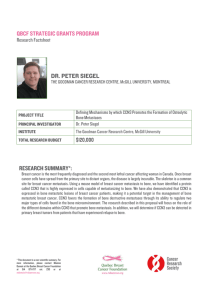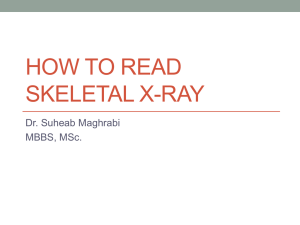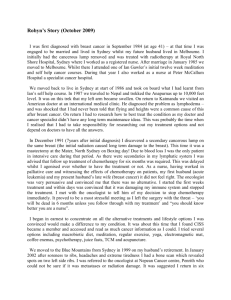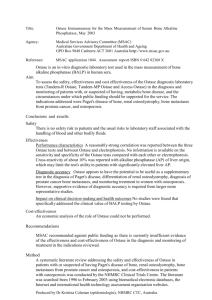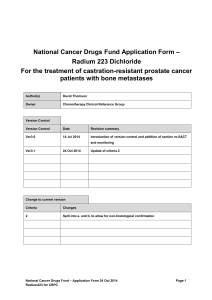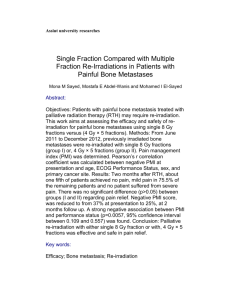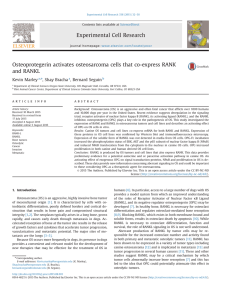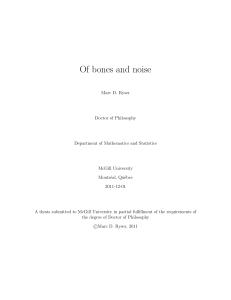Page 1 of 2 University of Toronto -- News@UofT -
advertisement
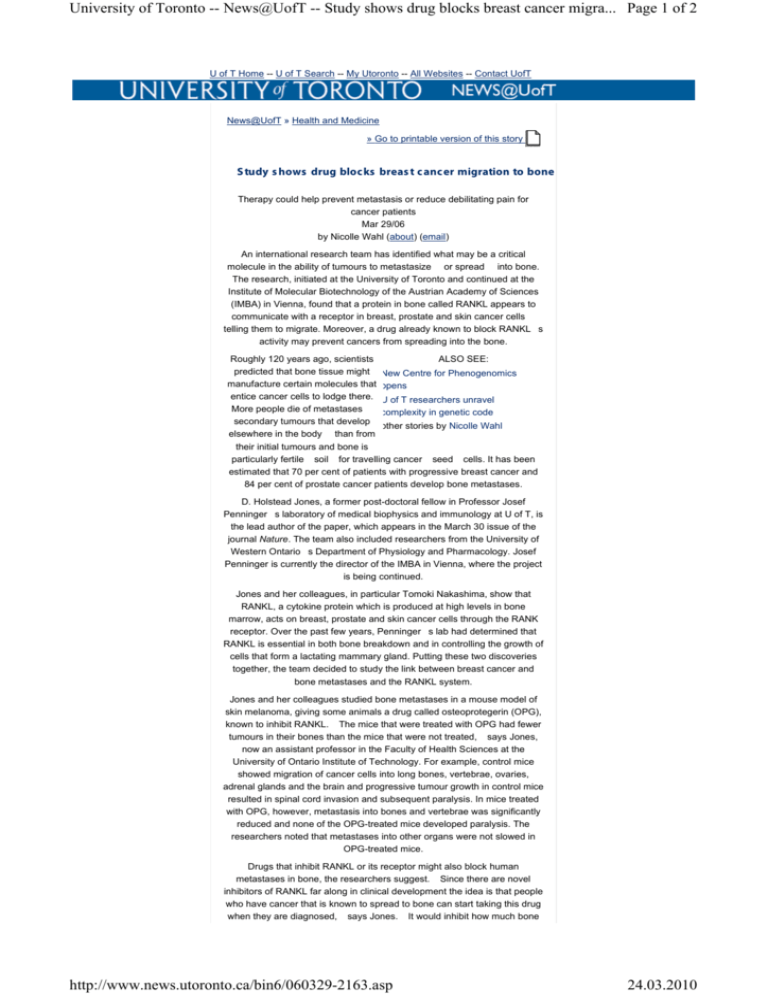
University of Toronto -- News@UofT -- Study shows drug blocks breast cancer migra... Page 1 of 2 U of T Home -- U of T Search -- My Utoronto -- All Websites -- Contact UofT News@UofT » Health and Medicine » Go to printable version of this story S tudy s hows drug bloc ks breas t c anc er migration to bone Therapy could help prevent metastasis or reduce debilitating pain for cancer patients Mar 29/06 by Nicolle Wahl (about) (email) An international research team has identified what may be a critical molecule in the ability of tumours to metastasize or spread into bone. The research, initiated at the University of Toronto and continued at the Institute of Molecular Biotechnology of the Austrian Academy of Sciences (IMBA) in Vienna, found that a protein in bone called RANKL appears to communicate with a receptor in breast, prostate and skin cancer cells telling them to migrate. Moreover, a drug already known to block RANKL s activity may prevent cancers from spreading into the bone. Roughly 120 years ago, scientists ALSO SEE: predicted that bone tissue might New Centre for Phenogenomics manufacture certain molecules that opens entice cancer cells to lodge there. U of T researchers unravel More people die of metastases complexity in genetic code secondary tumours that develop other stories by Nicolle Wahl elsewhere in the body than from their initial tumours and bone is particularly fertile soil for travelling cancer seed cells. It has been estimated that 70 per cent of patients with progressive breast cancer and 84 per cent of prostate cancer patients develop bone metastases. D. Holstead Jones, a former post-doctoral fellow in Professor Josef Penninger s laboratory of medical biophysics and immunology at U of T, is the lead author of the paper, which appears in the March 30 issue of the journal Nature. The team also included researchers from the University of Western Ontario s Department of Physiology and Pharmacology. Josef Penninger is currently the director of the IMBA in Vienna, where the project is being continued. Jones and her colleagues, in particular Tomoki Nakashima, show that RANKL, a cytokine protein which is produced at high levels in bone marrow, acts on breast, prostate and skin cancer cells through the RANK receptor. Over the past few years, Penninger s lab had determined that RANKL is essential in both bone breakdown and in controlling the growth of cells that form a lactating mammary gland. Putting these two discoveries together, the team decided to study the link between breast cancer and bone metastases and the RANKL system. Jones and her colleagues studied bone metastases in a mouse model of skin melanoma, giving some animals a drug called osteoprotegerin (OPG), known to inhibit RANKL. The mice that were treated with OPG had fewer tumours in their bones than the mice that were not treated, says Jones, now an assistant professor in the Faculty of Health Sciences at the University of Ontario Institute of Technology. For example, control mice showed migration of cancer cells into long bones, vertebrae, ovaries, adrenal glands and the brain and progressive tumour growth in control mice resulted in spinal cord invasion and subsequent paralysis. In mice treated with OPG, however, metastasis into bones and vertebrae was significantly reduced and none of the OPG-treated mice developed paralysis. The researchers noted that metastases into other organs were not slowed in OPG-treated mice. Drugs that inhibit RANKL or its receptor might also block human metastases in bone, the researchers suggest. Since there are novel inhibitors of RANKL far along in clinical development the idea is that people who have cancer that is known to spread to bone can start taking this drug when they are diagnosed, says Jones. It would inhibit how much bone http://www.news.utoronto.ca/bin6/060329-2163.asp 24.03.2010 University of Toronto -- News@UofT -- Study shows drug blocks breast cancer migra... Page 2 of 2 metastases they would have. Depending on the stage of cancer, it could be a preventive measure but it also may be something that would alleviate a lot of the pain that is produced by tumours within the bone. The findings are based on mouse studies and one always has to be careful to translate such studies to humans, cautions Penninger. However, the drug that blocks RANKL is already in late-stage clinical trials, meaning that it could be directly tested in humans with cancer in the near future. Cancer metastases into bones are a huge problem. The estimate is that every year one million people develop metastases to the bones, in particular women with breast cancer, says Penninger. The problem is that such metastases trigger severe cancer pain. With our findings we might not make people live longer but, if we are right, patients with cancer might have a much better quality of life. The study, which also involved researchers from McGill University and the University of Western Ontario, was funded by the Canadian Institutes of Health Research, the Canadian Arthritis Network, the Arthritis Society, the National Cancer Institute of Canada, IMBA, the Austrian National Bank, a European Union Marie Curie Excellence Grant and a European Union Marie Curie Mobility Fellowship. Contact: D. Holstead Jones, University of Ontario Institute of Technology, 905-7213111 ext. 2539; e-mail: Holly.JonesTaggart@uoit.ca Josef Penninger, Institute of Molecular Biotechnology of the Austrian Academy of Sciences, University of Vienna, University of Toronto, 011- 431-79044 ext. 4700; e-mail: Josef.penninger@imba.oeaw.ac.at Back to top | Printable version More stories on Health and Medicine | Discuss this story Also today, in News@UofT: U of T home to new Centre of Excellence | Dancing together: Festival showcases U of T's vibrant dance community This webpage was last updated on Nov. 8, 2007. Put Health and Medicine stories on your site (XML) http://www.news.utoronto.ca/bin6/060329-2163.asp 24.03.2010

